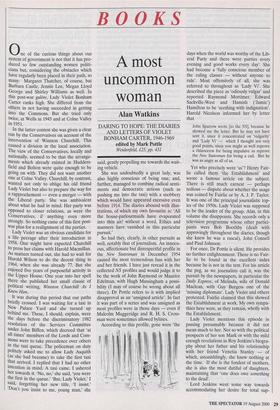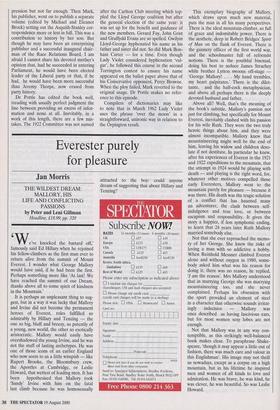BOOKS
A most
uncommon woman
Alan Watkins
DARING TO HOPE: THE DIARIES AND LETTERS OF VIOLET BONHAM CARTER, 1946-1969 edited by Mark Pottle Weidenfeld, £25, pp. 431 0 ne of the curious things about our system of government is not that it has pro- duced so few outstanding women politi- cians but, considering the obstacles which have regularly been placed in their path, so many: Margaret Thatcher, of course, but Barbara Castle, Jennie Lee, Megan Lloyd George and Shirley Williams as well. In this post-war galere, Lady Violet Bonham Carter ranks high. She differed from the others in not having succeeded in getting into the Commons. But she tried only twice, at Wells in 1945 and at Colne Valley in 1951.
In the latter contest she was given a clear run by the Conservatives on account of the intervention of Winston Churchill. This caused a division in the local association. The view of the Conservatives, locally and nationally, seemed to be that the arrange ments which already existed in Hudders- field and Bolton were quite enough to be going on with. They did not want another one at Colne Valley. Churchill, by contrast, wanted not only to oblige his old friend Lady Violet but also to prepare the way for a rapprochement — even a merger — with the Liberal party. She was ambivalent about what he had in mind. Her party was opposed to closer relations, as were the Conservatives, if anything even more strongly. So nothing came of this first post- war plan for a realignment of the parties.
Lady Violet was an obvious candidate for a life peerage after their introduction in 1958. One might have expected Churchill to press her claims with Harold Macmillan. As matters turned out, she had to wait for Harold Wilson to do the decent thing in 1964, when she was already 77. But she enjoyed five years of purposeful activity in the Upper House. One year into her spell there she published her small classic of political writing, Winston Churchill As I Knew Him.
It was during this period that our paths briefly crossed. I was waiting for a taxi in New Palace Yard and she turned up behind me. These, I should, explain, were the days before the discriminatory 1982 resolution of the Services Committee under John Biffen, which decreed that 'at all times' members of the Lords and Com- mons were to take precedence over others in the taxi queue. The policeman on duty politely asked me to allow Lady Asquith (as she had become) to take the first taxi that arrived. I replied that I had no other intention in mind. A taxi came. I ushered her towards it. 'No, no,' she said, 'you were the first in the queue."But, Lady Violet,' I said, forgetting her new title, 'I insist.' Don't you insist to me, young man,' she said, gently propelling me towards the wait- ing vehicle.
She was undoubtedly a great lady; was also highly conscious of being one; and, further, managed to combine radical senti- ments and democratic actions (such as pushing me into the taxi) with a snobbery which would have appeared excessive even before 1914. The diaries abound with illus- trations, of which my own favourite is: 'All the house-parlourmaids have evaporated into thin air! without a word. Ethics and manners have vanished in this particular pursuit.'
So had they, clearly, in other pursuits as well, notably that of journalism. An innocu- ous, affectionate but disrespectful profile in the New Statesman in December 1954 caused the most tremendous fuss with her and her friends. I have just reread it in the collected NS profiles and would judge it to be the work of John Raymond or Maurice Edelman, with Hugh Massingham a possi- bility (I may of course be wrong about all three). Dr Pottle refers to it with implied disapproval as an 'unsigned article'. In fact it was part of a series and was unsigned as most profiles were in those days — even if Malcolm Muggeridge and R. H. S. Cross- man were sometimes allowed bylines.
According to this profile, gone were 'the days when the world was worthy of the Lib- eral Party and there were parties every evening and good works every day'. She had become a 'fully conscious member of the ruling classes — without anyone to rule'. Most offensively of all, she was referred to throughout as 'Lady Vi'. She described the piece as 'odiously vulgar' and reported Raymond Mortimer, Edward Sackville-West and Hamish (`Jamie') Hamilton to be 'seething with indignation'. Harold Nicolson informed her by letter that
John Sparrow wrote [to the NS], because he showed me the letter. But he may not have sent it, since it concentrated on 'vulgarity' and 'Lady Vi' — which I thought not very good points, since you might as well reprove a rhinoceros for being impulsive as reprove the New Statesman for being a cad. But he was as angry as all of us.
Yet who precisely were 'us'? Henry Fair- lie called them 'the Establishment' and wrote a famous article on the subject. There is still much earnest — perhaps tedious — dispute about whether the usage was coined by Fairlie or by A. J. P. Taylor. It was one of the principal journalistic top- ics of the 1950s. Lady Violet was supposed to be the leader of the group. Alas, in this volume she disappoints. She records only a television programme whose other partici- pants were Bob Boothby (dealt with approvingly throughout the diaries, though she knew he was a rascal), John Connell and Paul Johnson.
For once, Dr Pottle is silent. He provides no further enlightenment. There is no Fair- lie to be found in the excellent index because he is not in the text. For his article the peg, as we journalists call it, was the pursuit by the newspapers, in particular the Daily Express, of Melinda, wife of Donald Maclean, with Guy Burgess one of the `missing diplomats'. Lady Violet and others protested. Fairlie claimed that this showed the Establishment at work. My own sympa- thies here were, as they remain, wholly with the Establishment.
Lady Violet mentions this episode in passing presumably because it did not mean much to her. Not so with the political prospects of her son Mark or with the mild enough revelations in Roy Jenkins's biogra- phy about her father and his relationship with her friend Venetia Stanley — of which, astonishlingly, she knew nothing at the time. If she is the fondest of mothers, she is also the most dutiful of daughters, maintaining that 'one does owe something to the dead'.
Lord Jenkins went some way towards accommodating her desire for total sup- pression but not far enough. Then Mark, his publisher, went on to publish a separate volume (edited by Michael and Eleanor Brock) setting out the Asquith-Stanley cor- respondence more or less in full. This was a contribution to history by her son. But though he may have been an enterprising publisher and a successful inaugural chair- man of the Race Relations Board, I am afraid I cannot share his devoted mother's opinion that, had he succeeded in entering Parliament, he would have been elected leader of the Liberal party or that, if he had, he would have been more successful than Jeremy Thorpe, now erased from party history.
Dr Pottle has edited the book well, treading with usually perfect judgment the line between providing an excess of infor- mation and none at all. Inevitably, in a work of this length, there are a few mis- takes. The 1922 Committee was not named after the Carlton Club meeting which top- pled the Lloyd George coalition but after the general election of the same year: it was set up for the benefit and guidance of the new members. Gerard Fay, John Grist and Gruffydd Evans are so spelled. Gwilym Lloyd-George hyphenated his name as his father and sister did not. So did Mark Bon- ham Carter — for a time. Even though Lady Violet considered hyphenation 'vul- gar', he followed this course in the second Torrington contest to ensure his name appeared on the ballot paper above that of his Conservative opponent, Percy Browne. When the ploy failed, Mark reverted to the original usage. Dr Pottle makes no refer- ence to this episode.
Compilers of dictionaries may like to note that in March 1962 Lady Violet uses the phrase 'over the moon' in a straightforward, unironic way in relation to the Orpington result.



























































 Previous page
Previous page